- Brazil: Background Information
- Definition of Vicious Cycle
- How Different Aspects Interact to Form the Vicious Cycle
- Main Environmental Challenges in Brazil
- Vicious Cycle of Poverty in Brazil
- Brazil Economy and link to Environmental Issues, Poverty and Institutions
- Suggestions
- Expected Issues while Implementing Suggestions
- References
Brazil: Background Information
Location: Latin America.
Population:
- 199 million people;
- 60% of the total population live in large cities;
- 21.4% of the total population live below poverty line.
Weather:
- High summer temperatures;
- Frosts in July and August;
- Heavy rainfall in Amazon all year round.
Economy:
Brazil’s cities generate 90% of GDP;
The industrial sector, manufacturing and agricultural sectors steer the economy of the country.
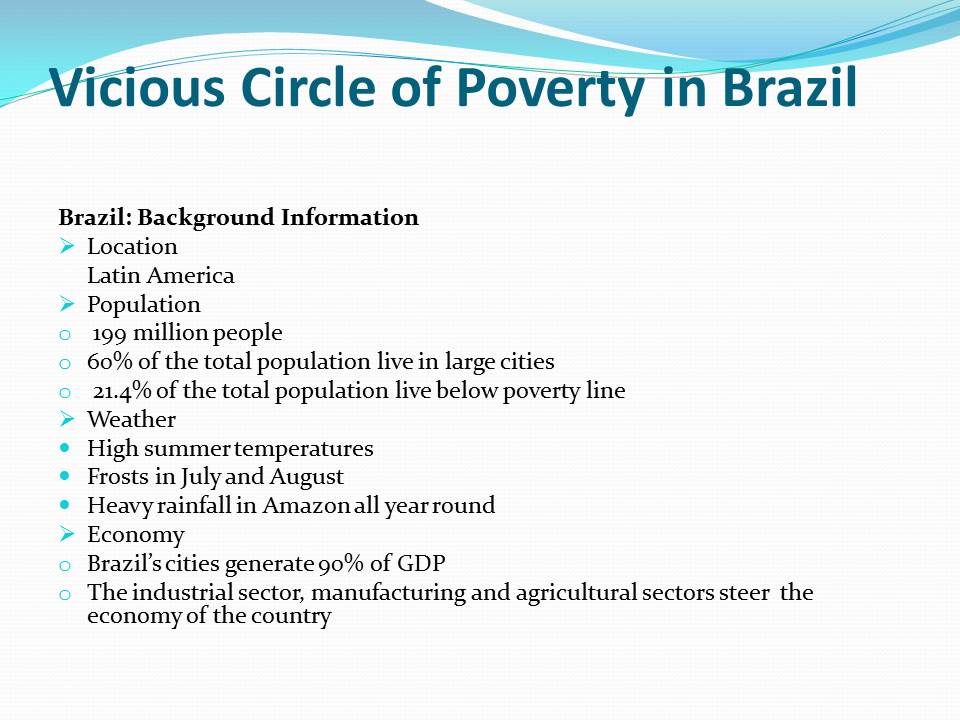
Definition of Vicious Cycle
The vicious circle of poverty is “a circular constellation of forces that tend to act and react on each other in such a way that the country in poverty maintains its poor state” (Katel, Kregel & Reinert, 2009, p. 102).
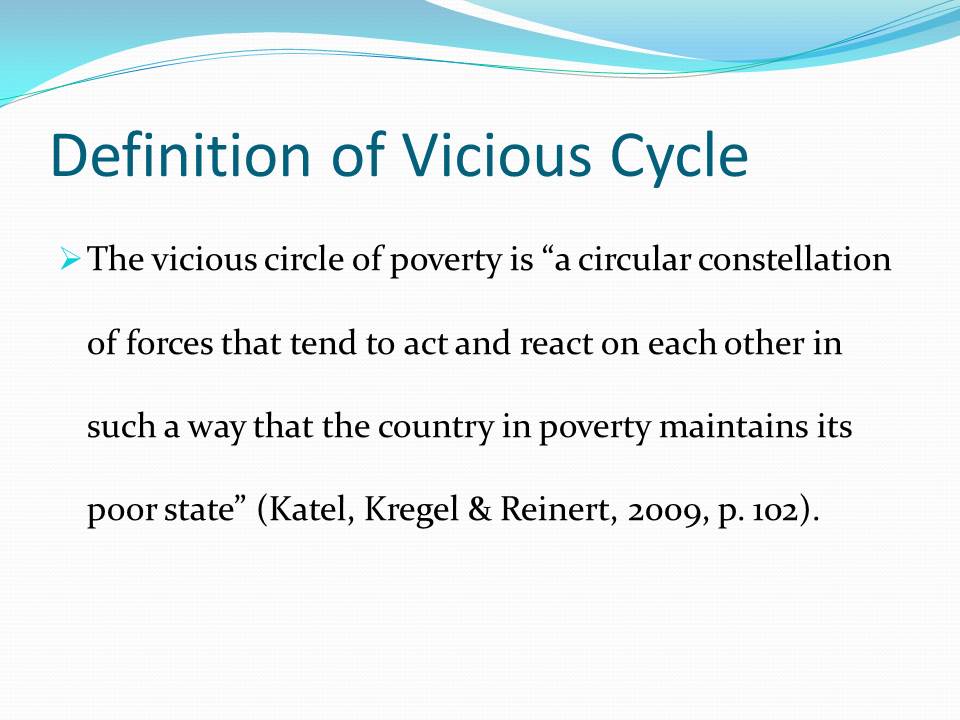
How Different Aspects Interact to Form the Vicious Cycle
- Economic Production;
- Environment;
- Income Distribution;
- Resources;
- Sustainable development;
- High capital per income;
- Equity in income distribution;
- Environmental protection;
- Participation;
- Aspects of Socio-physical development (Ascher & Healy, 1990).
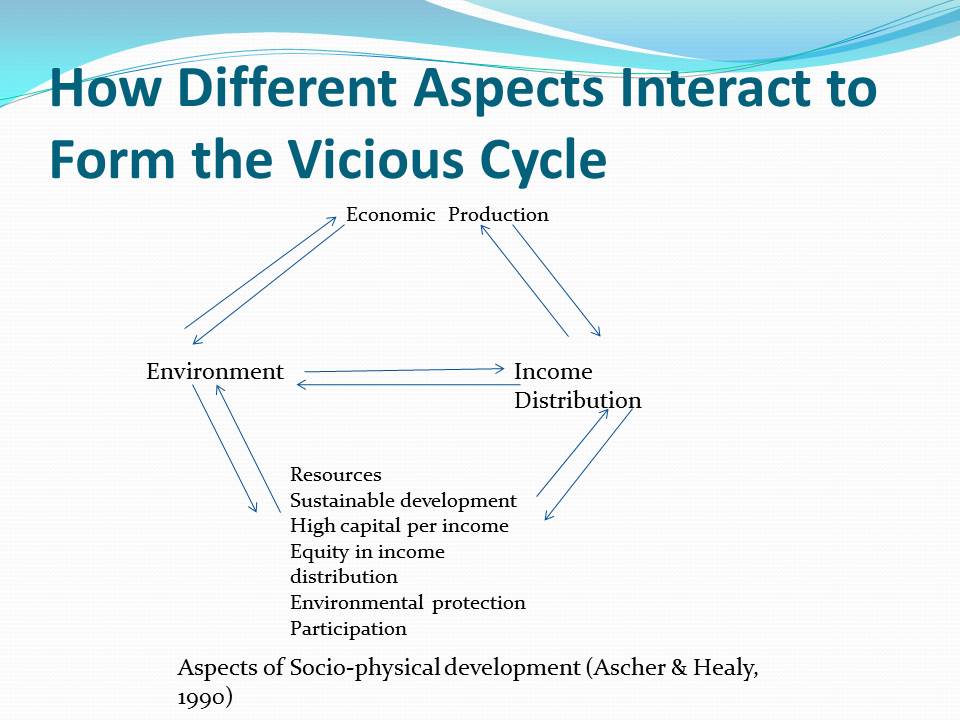
Main Environmental Challenges in Brazil
Deforestation:
- The leading environmental problem in the country.
- Prevalent in the Atlantic forest and the Amazon rainforest (Fearnside & Barbosa, 1996).
- Deforestation occurs due to credit policies, road and construction, land tenure, and demand for soy, beef and milk.
- Economic forces such as land distribution also lead to deforestation.
- Causes floods in these areas
Air pollution:
- Prevalent in main Brazilian cities (Salati, 2007).
- Mainly due to industrialization and the transport sector.
- A law to auto emissions was established to control air pollution back in 1993.
- Nevertheless, vehicle-based emissions are still on the rise.
Waste Disposal:
- No connections to sewerage systems (Laurance & Fearnside, 2002) i.e. 75 million of citizens who live in metropolitan areas do not have sewage treatment
- Poor Sanitation: 20 million citizens who live in metropolitan areas lack running water
Poor waste management:
- 60 million in urban areas stay with uncollected garbage.
- Despite the growing sanitary coverage of the Brazilian residents, Brazil’s city administrations dispose these wastes poorly after collecting them.
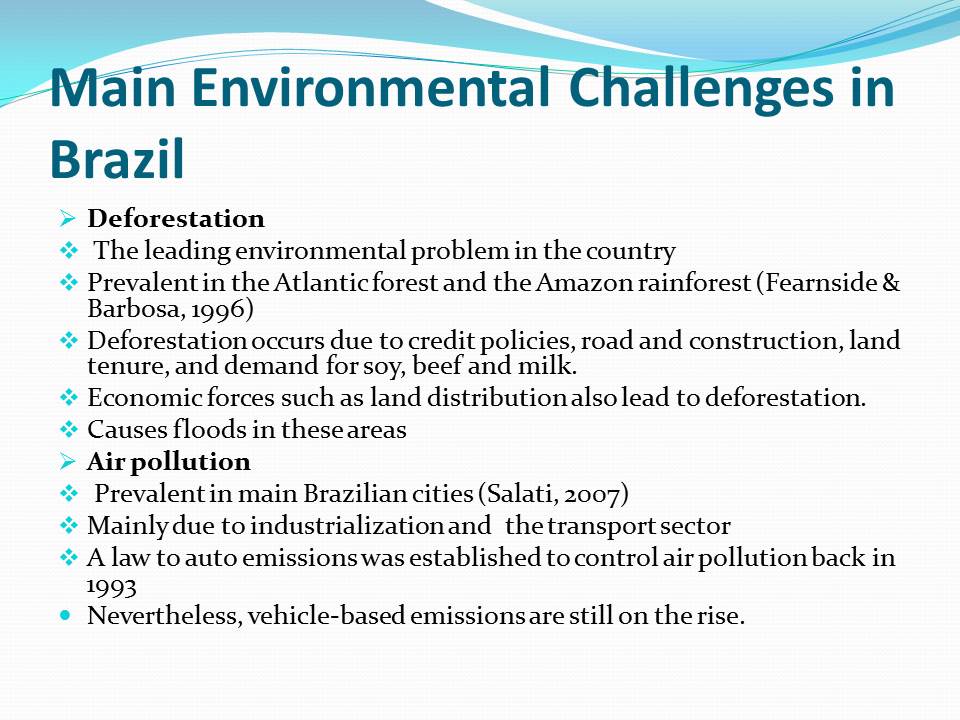
Vicious Cycle of Poverty in Brazil
- No funds for protection against the effects of pollution or for immediate treatment.
- Reside in overcrowded areas.
- Exposure to diseases such as diarrhea, typhoid, or parasitic infection.
- Lack adequate water supply, sanitation services and systems of waste disposal.
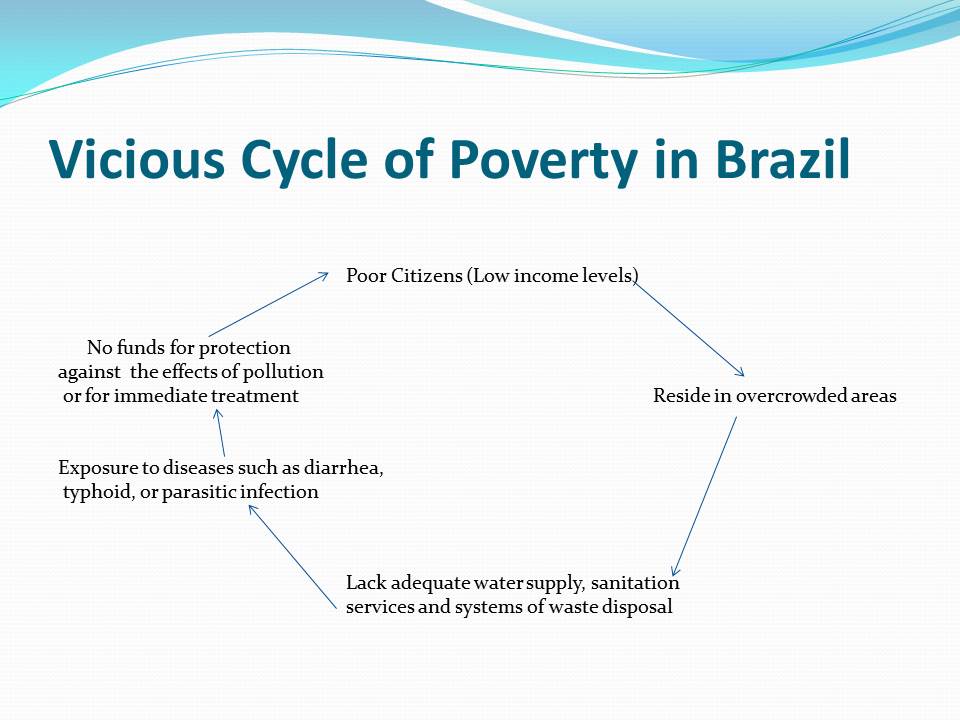
Brazil Economy and link to Environmental Issues, Poverty and Institutions
Developments in industrial sector and road infrastructure.
Uneven income distribution and geographic segmentation.
Pollution from industries and transport sector.
Lack sufficient funds to seek care and treatment.
Establishment and Fall of institutions meant to control pollution (e.g “the Plan for the Acceleration of Growth” that lasted until 2011).
Exposure to diseases such as diarrhea, typhoid, or parasitic infection.
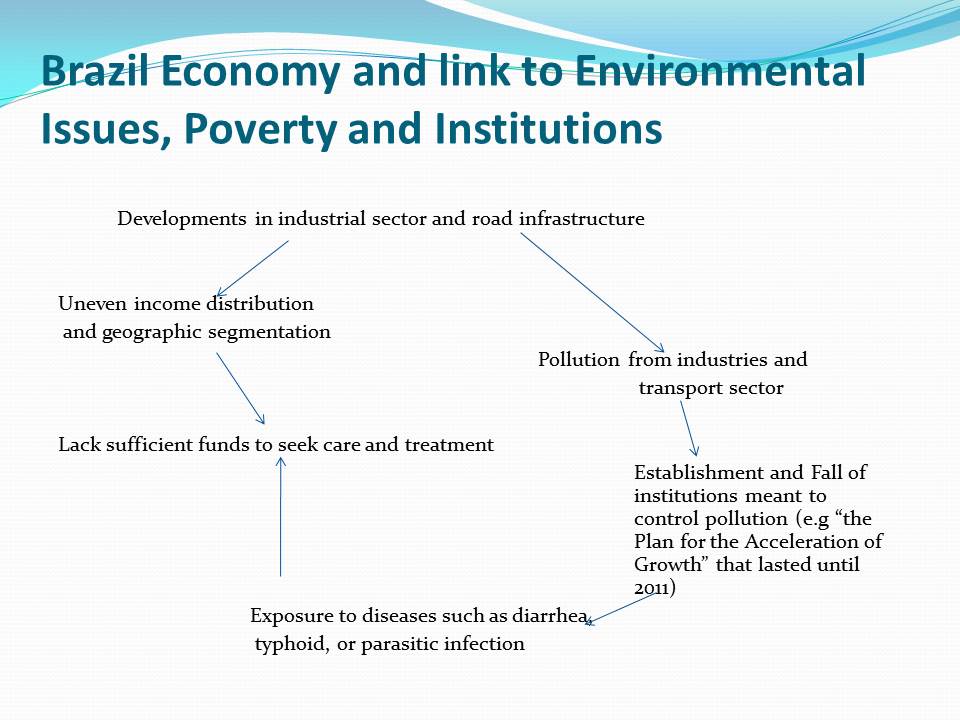
Suggestions
Government/environmental management should take an integrated approach to solve the problem of deforestation, air pollution and waste disposal i.e.:
- Integrating environmental activities with activities in other segments, or
- Integrating sector policies and environmental policies.
- E.g., at the civic level, transport and urban services planning can be upgraded to cut down urban congestion, sprawl and air pollution.
- Also, campaigns against deforestation can be included in the themes of civil planning.
Government to focus on activities that bridge the gap between the rich and the poor to reduce overexploitation of natural resources e.g.:
- Educational policies aimed at encouraging the poor to acquire education;
- Policies that promote health assistance among the poor: By bridging this gap, there will be reduced scramble for natural resources such as land for farming and this will in turn reduce deforestation.
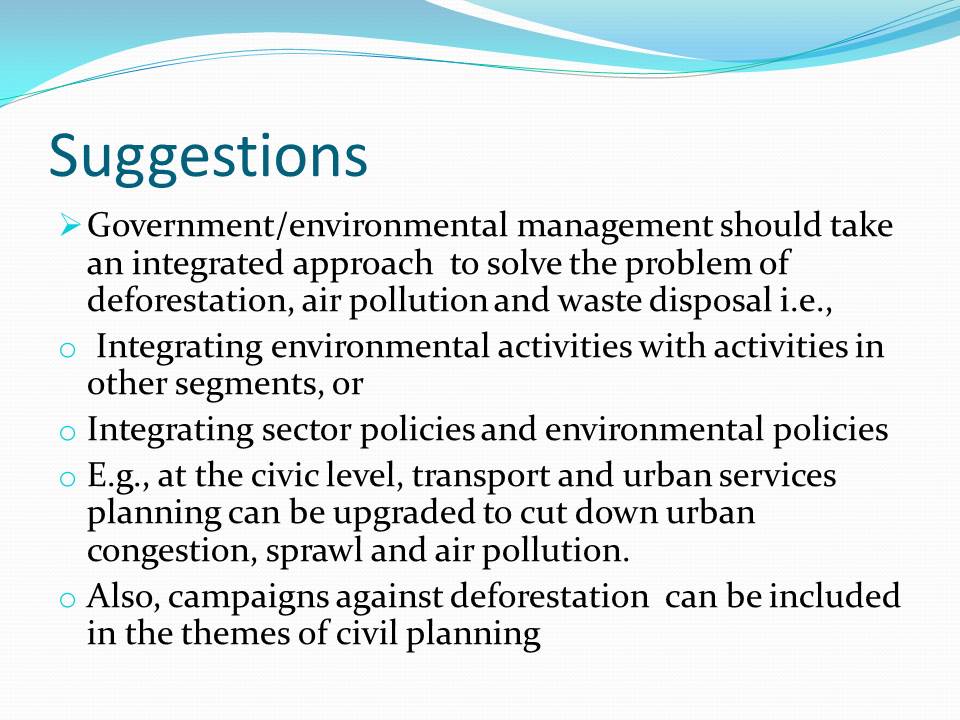
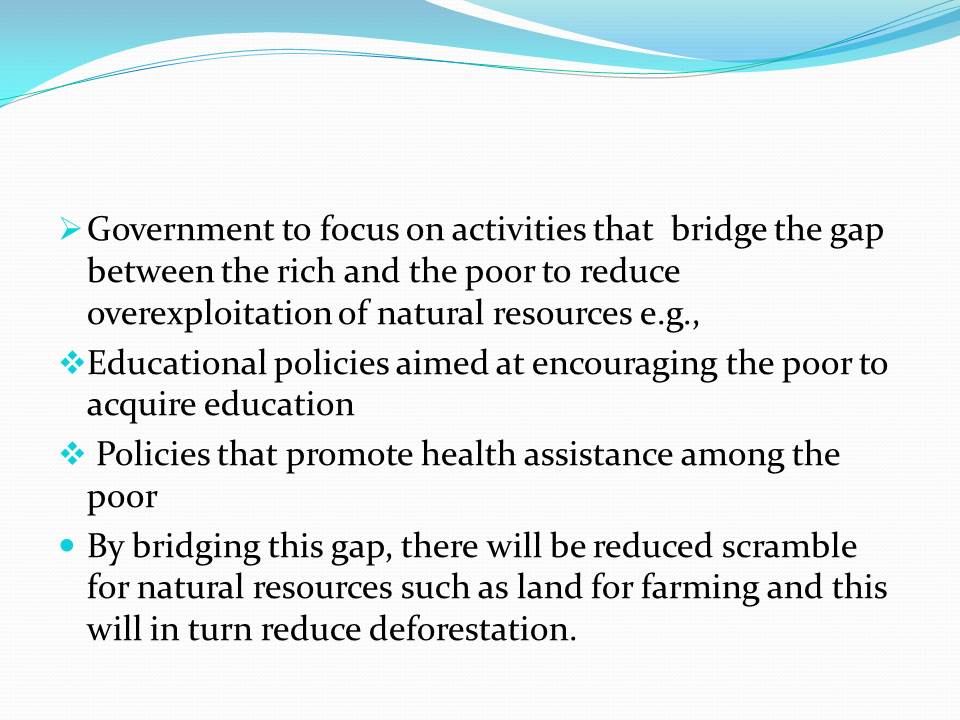
Expected Issues while Implementing Suggestions
- Lack of cooperation, or commitment from other sectors;
- Inadequate funds to implement environmental policies along with sector polices;
- Insufficient personnel to conduct awareness campaigns.
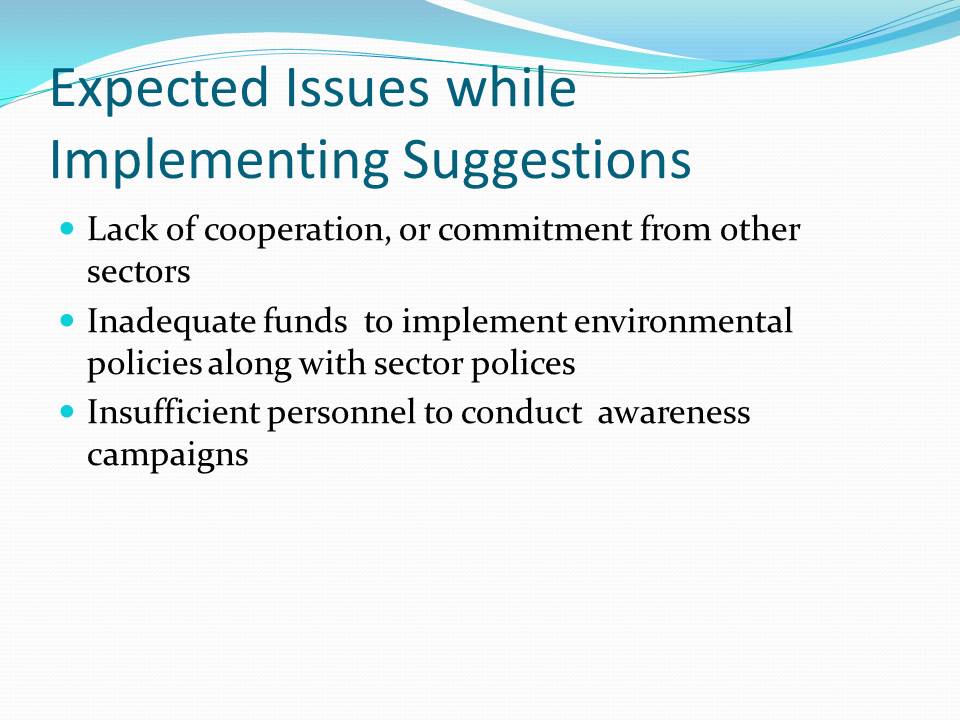
References
Ascher, W., & Healy, R. (1990). Natural resource policymaking in developing countries: Environment, economic growth, and income distribution. Durham: Duke University Press.
Fearnside, P. & Barbosa, R. (1996). Political benefits as barriers to assessment of environmental costs in Brazil’s Amazonian development planning the example of the Jatapu Dam in Roraima. Environmental Management, 20 (5), 615-630.
Katel, R., Kregel, J. & Reinert, E. (2009). RagnarNurkse: Trade and Development. London: Anthem Press.
Laurance, W. & Fearnside, P. (2002). Issues in Amazonian development. Science, 295 (27), 1643-1655.
Salati, E. (2007).Relevant environmental issues. EstudosAvancados, 21(56), 107-127.